外研版2017年中考一轮教材复习课件:七年级下册 Modules 4-6
文档属性
| 名称 | 外研版2017年中考一轮教材复习课件:七年级下册 Modules 4-6 | 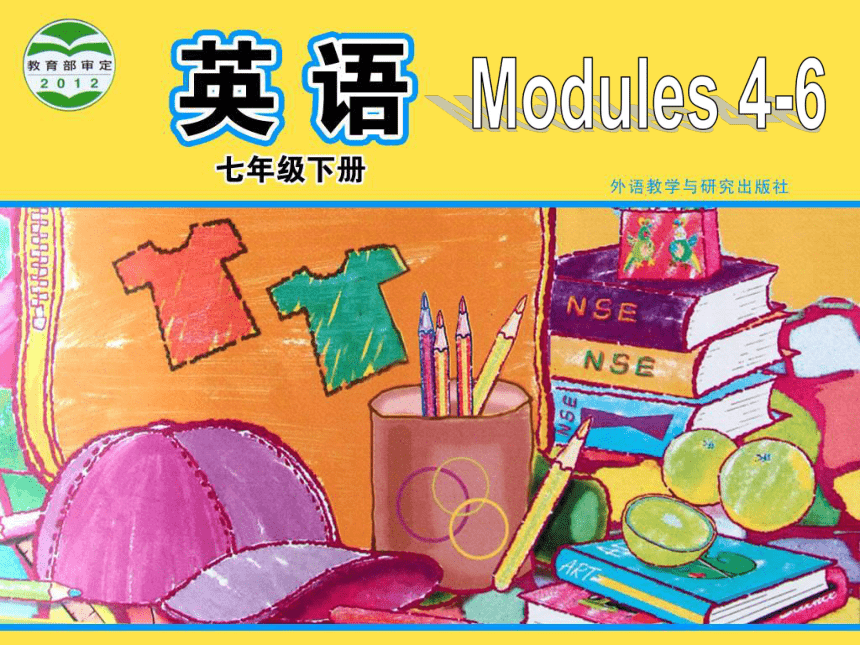 | |
| 格式 | zip | ||
| 文件大小 | 1.5MB | ||
| 资源类型 | 教案 | ||
| 版本资源 | 外研版 | ||
| 科目 | 英语 | ||
| 更新时间 | 2017-01-25 16:26:10 | ||
图片预览

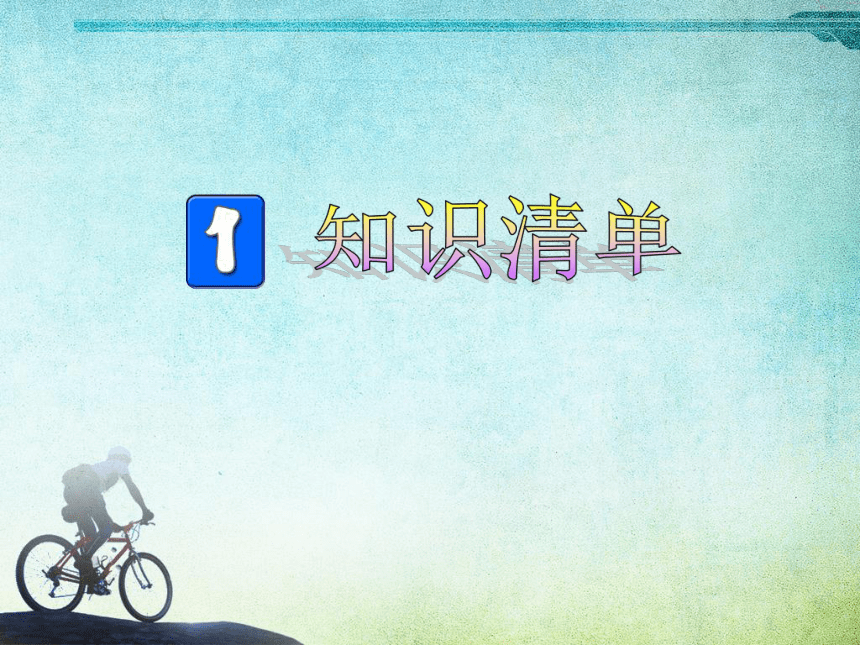
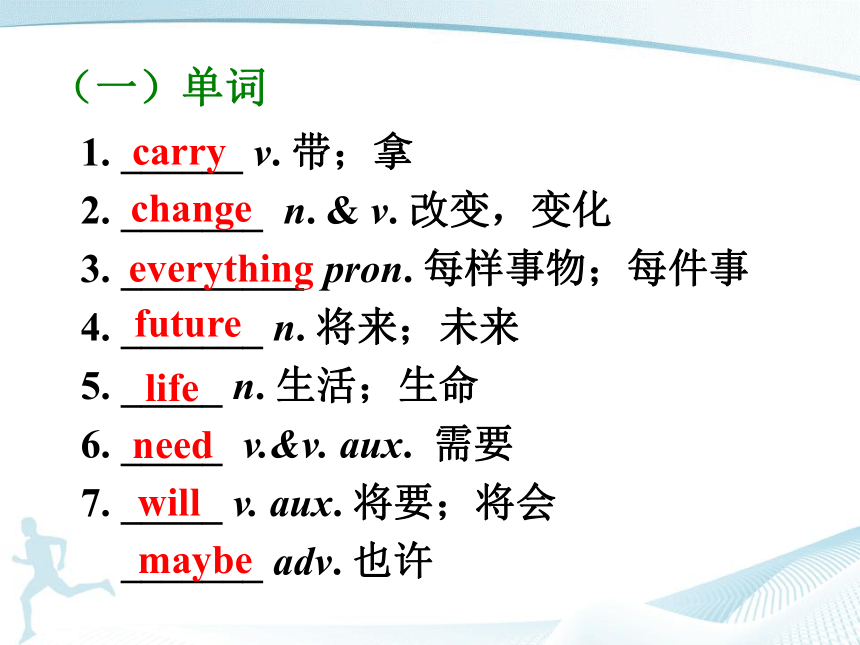
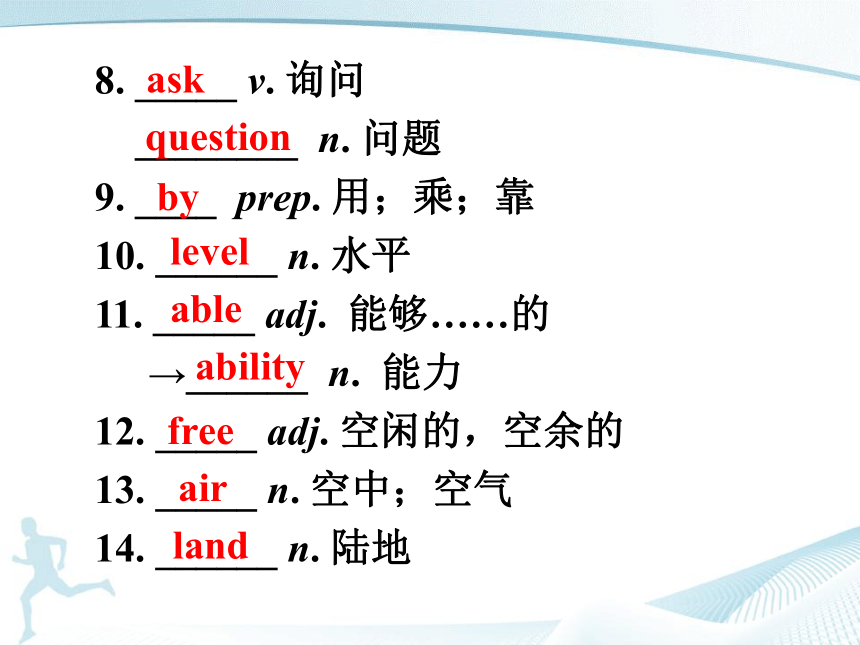
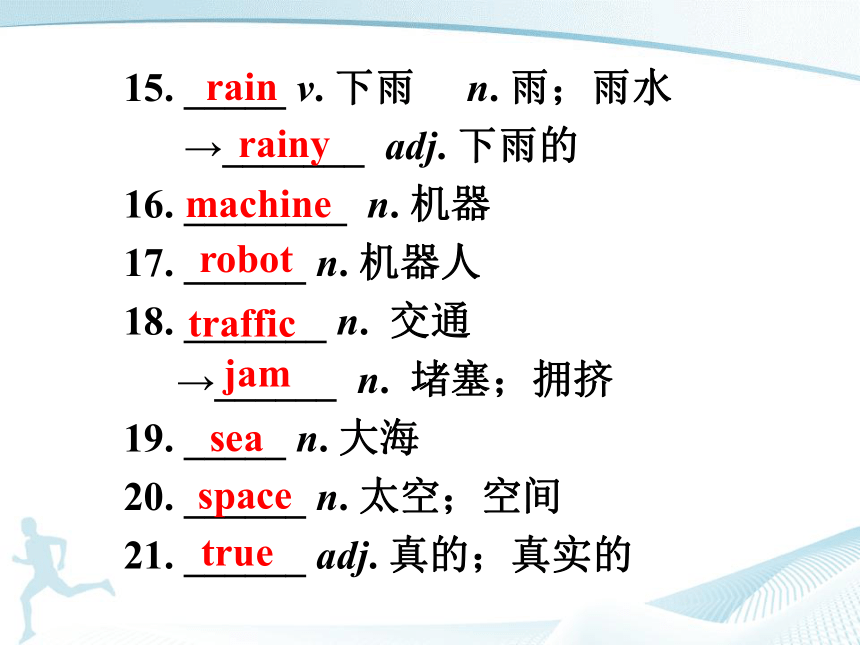
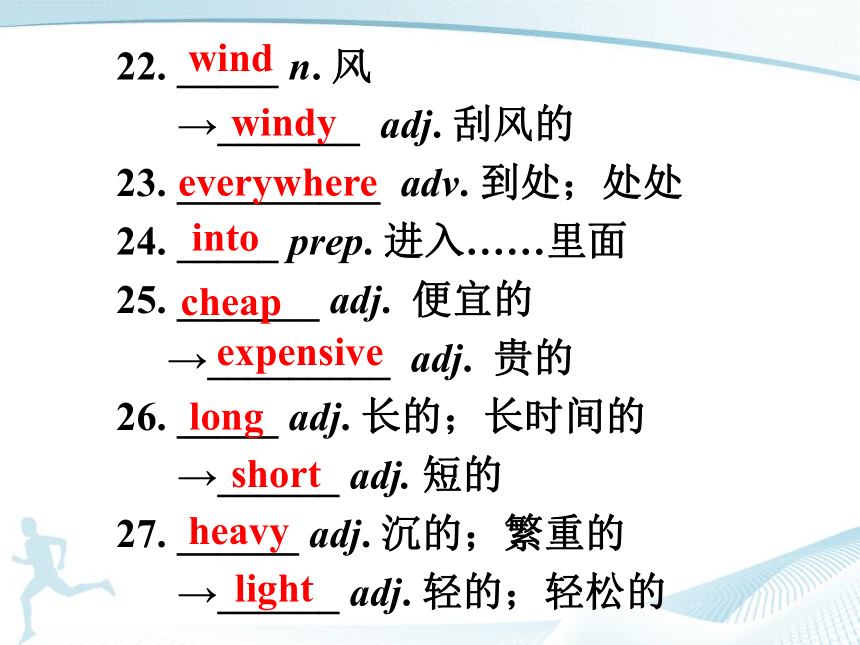
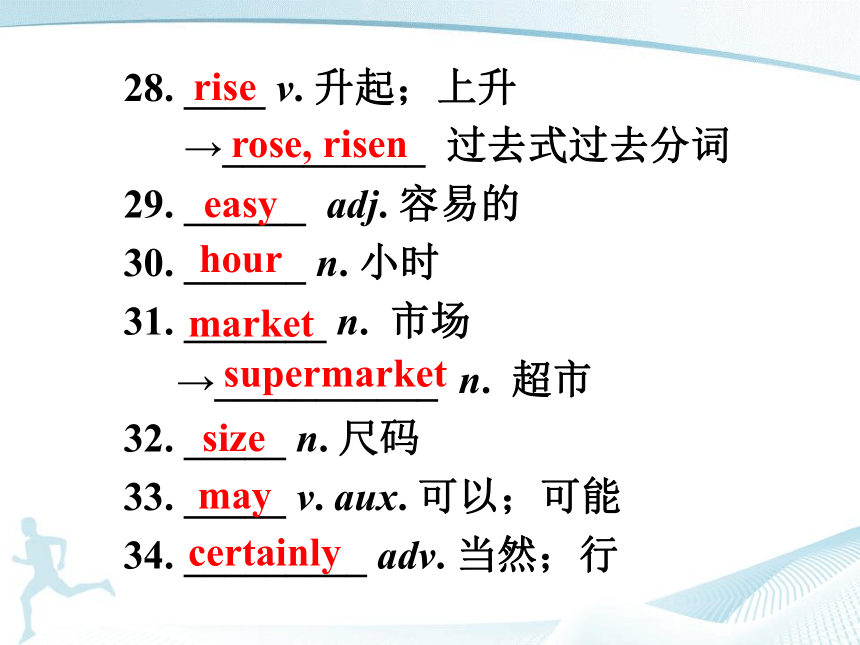
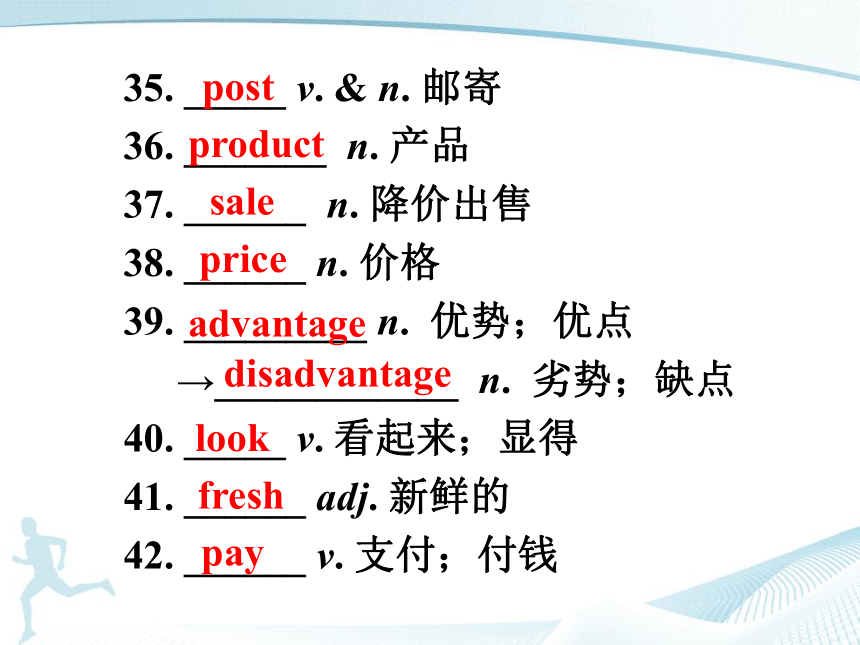
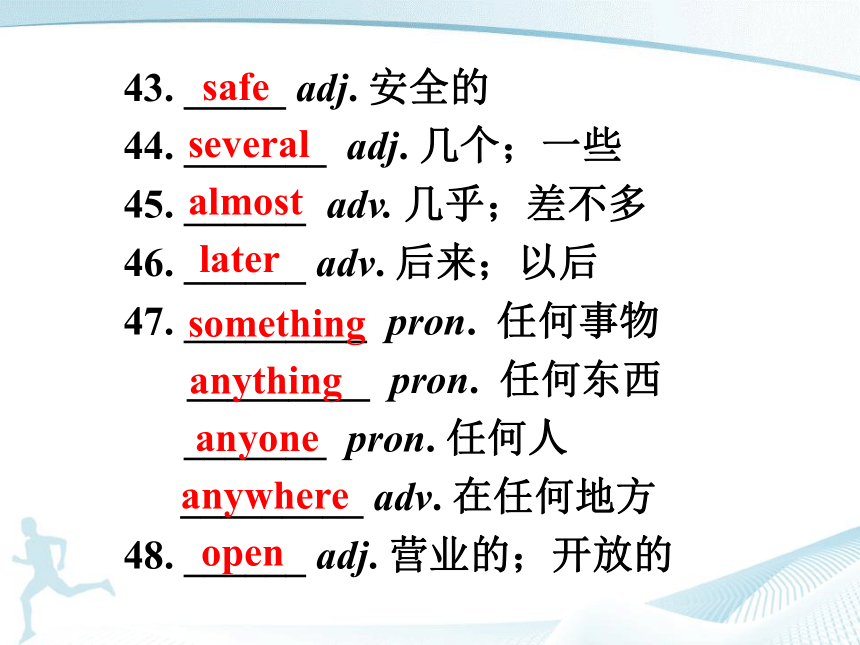
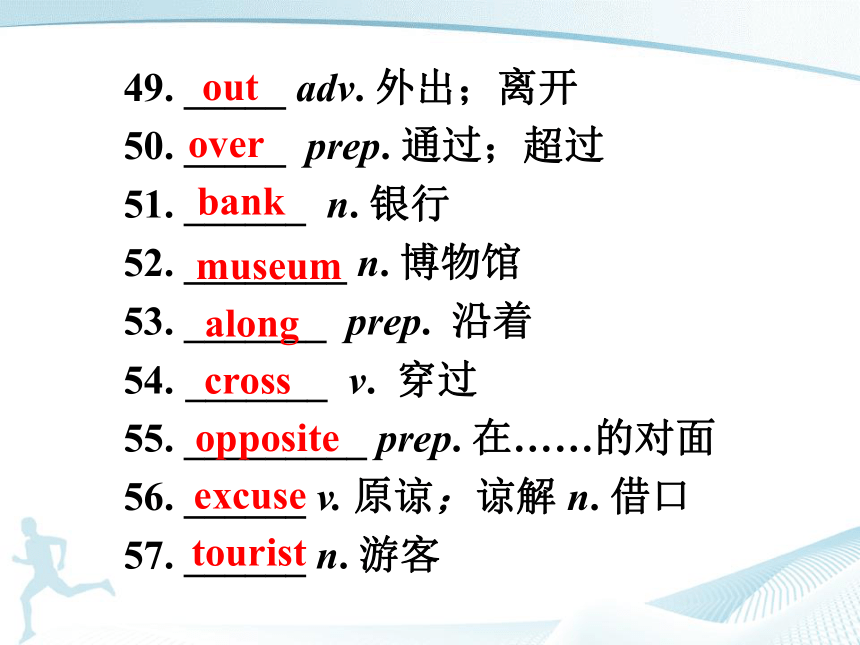
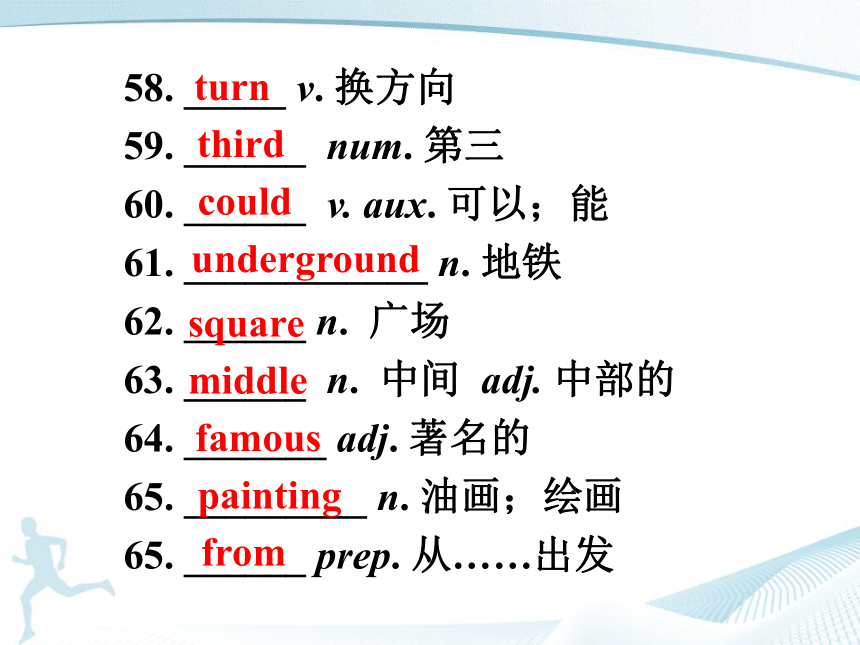
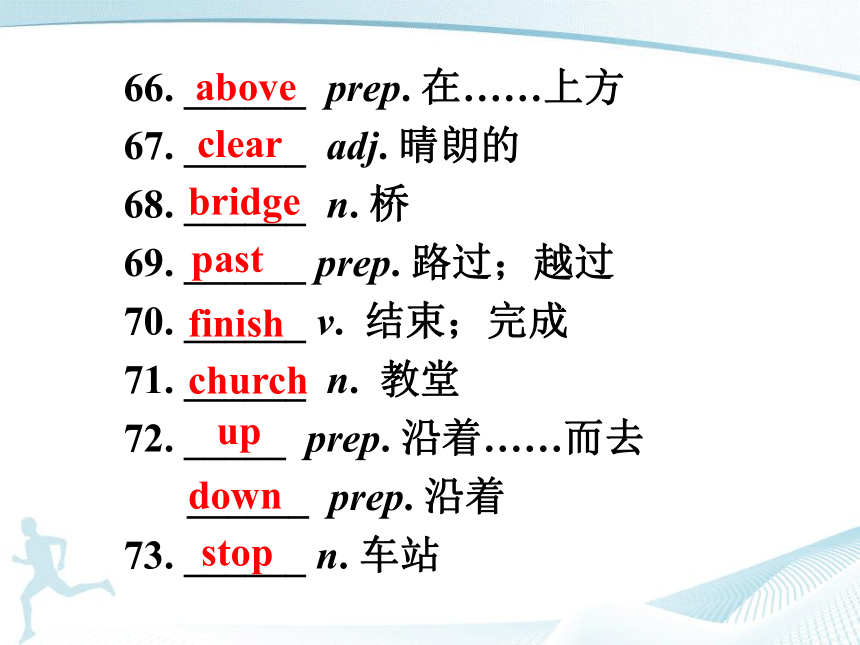
文档简介
课件106张PPT。Modules 4-6知识清单1. ______ v. 带;拿
2. _______ n. & v. 改变,变化
3. _________ pron. 每样事物;每件事
4. _______ n. 将来;未来
5. _____ n. 生活;生命
6. _____ v.&v. aux. 需要
7. _____ v. aux. 将要;将会
_______ adv. 也许(一)单词carrychangeeverythingfuturelifeneedwillmaybe8. _____ v. 询问
________ n. 问题
9. ____ prep. 用;乘;靠
10. ______ n. 水平
11. _____ adj. 能够……的
→______ n. 能力
12. _____ adj. 空闲的,空余的
13. _____ n. 空中;空气
14. ______ n. 陆地askquestionbylevelableabilityfreeairland15. _____ v. 下雨 n. 雨;雨水
→_______ adj. 下雨的
16. ________ n. 机器
17. ______ n. 机器人
18. _______ n. 交通
→______ n. 堵塞;拥挤
19. _____ n. 大海
20. ______ n. 太空;空间
21. ______ adj. 真的;真实的rainrainymachinerobottrafficjamseaspacetrue22. _____ n. 风
→_______ adj. 刮风的
23. __________ adv. 到处;处处
24. _____ prep. 进入……里面
25. _______ adj. 便宜的
→_________ adj. 贵的
26. _____ adj. 长的;长时间的
→______ adj. 短的
27. ______ adj. 沉的;繁重的
→______ adj. 轻的;轻松的windwindyeverywhereintocheapexpensivelongheavylightshort28. ____ v. 升起;上升
→__________ 过去式过去分词
29. ______ adj. 容易的
30. ______ n. 小时
31. _______ n. 市场
→___________ n. 超市
32. _____ n. 尺码
33. _____ v. aux. 可以;可能
34. _________ adv. 当然;行riserose, riseneasyhourmarketsupermarketsizemaycertainly35. _____ v. & n. 邮寄
36. _______ n. 产品
37. ______ n. 降价出售
38. ______ n. 价格
39. _________ n. 优势;优点
→____________ n. 劣势;缺点
40. _____ v. 看起来;显得
41. ______ adj. 新鲜的
42. ______ v. 支付;付钱postproductsalepriceadvantagedisadvantagelookfreshpay43. _____ adj. 安全的
44. _______ adj. 几个;一些
45. ______ adv. 几乎;差不多
46. ______ adv. 后来;以后
47. _________ pron. 任何事物
_________ pron. 任何东西
_______ pron. 任何人 _________ adv. 在任何地方
48. ______ adj. 营业的;开放的safeseveralalmostlatersomethinganythinganyoneanywhereopen49. _____ adv. 外出;离开
50. _____ prep. 通过;超过
51. ______ n. 银行
52. ________ n. 博物馆
53. _______ prep. 沿着
54. _______ v. 穿过
55. _________ prep. 在……的对面
56. ______ v. 原谅;谅解 n. 借口
57. ______ n. 游客outoverbankmuseumalongcrossoppositeexcusetourist58. _____ v. 换方向
59. ______ num. 第三
60. ______ v. aux. 可以;能
61. ____________ n. 地铁
62. ______ n. 广场
63. ______ n. 中间 adj. 中部的
64. _______ adj. 著名的
65. _________ n. 油画;绘画
65. ______ prep. 从……出发 turnthirdcouldundergroundsquaremiddlefamouspaintingfrom66. ______ prep. 在……上方
67. ______ adj. 晴朗的
68. ______ n. 桥
69. ______ prep. 路过;越过
70. ______ v. 结束;完成
71. ______ n. 教堂
72. _____ prep. 沿着……而去
______ prep. 沿着
73. ______ n. 车站 aboveclearbridgepastfinishchurchupdownstop1. _______?和;又;也?
2. ___________?在任何时间
3. ________________?能够做某事
4. __________?通过因特网
5. _________?通过邮寄的方式
6. _________ (希望、梦想等)实现,成真
7. _________?到达???????????????????(二)短语as wellat any timebe able to do sth.by Internetby postcome trueget to?8. _________?穿过
9. _________?沿着……走
10. _______?外出;游玩
11. ___________???将来
12. __________?看起来新鲜
13. _____________?母亲节
14. ______________?不再……
15. ____________________?
不仅……,而且……go acrossgo alonggo outin the futurelook freshMother's Daynot ... any morenot only ... but also ...16. _____________?在晴朗的日子
17. ________?总有一天??
18. ________ ……之一
19. ______________?网上购物
20. ___________?为某物付钱
21. __________________?网上付款
22. __________??邮政局??????
23. __________??交通堵塞
24. _______?试穿????on a clear dayone dayone of ...online shoppingpay for sth.pay over the Internetpost officetraffic jamtry on25. ________?向左拐
26. _____________?别急;稍等一会
27. _____________??工作时间turn leftwait a minuteworking hours1. Will schools be different in the future, Daming?
2. In twenty years’ time, maybe there won’t be any schools!
3. What will life be like in the future?
4. Here are some ideas.?
5. What can I do for you?
6. What color does she like?(三)句式7. What size does she take?
8. May I try it on?????????
9. How much are they?
10. What else would you like?
11. That’ll be thirty?yuan.
12. Excuse me! Can you tell me the way to
Wangfujing Dajie?
13. How can I get there?
14. Why not ask the policeman over there?15. Could you tell me how to get to the National Stadium?
16. Go along the street and you'll see an underground station.
17. Have a nice day!
18. Welcome to this short tour of?London.核心要点(一)单词1. carry v. 拿;带;搬运
【归纳】
? carry back to 使回忆起
carry off 夺走,抢走,使……成功?
carry on 继续,进行
carry out ?进行实验实行计划完成任务
carry through 贯彻(计划),使(人)
渡过(困难、危险等) 【即学即练】完成下列句子。
1. The managers discussed the plan that they would like to _________ the next year.
2. Though tired and hungry, she _________ until she reached camp.
3. The sight of the place _______ her ______ her childhood.
4. His courage _______ him ________ his illness.carried through?carry outcarried oncarried back to【拓展】fetch, carry, take & bring
fetch“(去)拿来”,到别处把人或物请来或拿来,有“去”的意思,又有“来”的意思。
carry“搬运;携带”,不强调动作的方向。
take?“带走”,把人或物带离说话人所在的地方。
bring?“带来”,把人或物带到说话人所在的地方。【运用】用fetch, carry, take或bring的适
当形式填空。
1. Please _______ these books to the library.
2. Kim, please go to the reading room and _______ the English book for me.
3. Jerry _______ his cousin to my birthday party yesterday.
4. This bag is too heavy. Could you please _______ it for me?takefetchbrought carry2. future n. 未来,将来;前途
【归纳】
in the future 强调将来某一时间。
in future “今后;从今以后”。同义短语from now on。【运用】单项选择。
Everyone wants to live a happy life _____, so we must work hard now.
A. as future B. in a future
C. in the future D. in futures3. need v.&v. aux. 需要
【归纳】
1) need用作实义动词时,有人称,时态和数的变化,后接名词、代词或带to的动词不定式。否定式和疑问式需借助助动词do/does。
2) need作情态动词时,没有人称和数的变化,后接动词原形,主要用于否定句和疑问句中。【运用】Complete the sentences.
1. It’s fine today. We _________ (not need) to stay at home.
2. He doesn’t need ______ (go) home early.
3. Need he _____ (do) his homework first?don’t needto godo将下列汉语句子翻译成英语。
(1) 他需要知道这件事吗?
Does he need to know the thing? /
Need he know the thing?
(2) 你不需要这么早来这儿。
You needn’t come here so early. / You
don’t need to come here so early.
(3) 我们需要更多的信息。
We need more information. 4. true adj. 真的;真实的
【归纳】
作表语或定语。短语:come true 实现 true to life (书、电影等)真实的;逼真的。
【拓展】
truly是副词,“真实地;诚挚地”,句中作状语,修饰形容词或副词。也可作为正式书信的结束语,放在署名前。5. rise
【归纳】
常用作不及物动词,含有“(自然或非主观因素地)升起;上升”的意思,并且还有“起床”的意思。rise和raise
【读音区分】rise读作/raIz/,raise读作/reIz/。
【词性区分】rise常作不及物动词,而raise常作及物动词。
【语义区分】rise有“上升;升起;上涨”等意思,而raise有“举起;抬起;饲养;筹集”等意思。翻译以下句子。
The moon rises.
月亮升起了。
We are surprised that the price of the house is rising so rapidly.
房价上涨的这么快,我们感到很吃惊。He raised his head and looked at the blackboard.
他抬起头看着黑板。
His mother raised many ducks on the farm.
他妈妈在农场养着很多鸭子。
They are raising money for Project Hope.
他们正在为希望工程筹钱。6. short
【归纳】
是形容词,意思是“短的;短暂
的;矮的”,作“短的”讲时,反义词是 long “长的”;而作“矮的”讲时,反义词是 tall “高的”。7. take
【归纳】
v. 穿(某尺寸的衣服或鞋子)
I’ll take it.
take “买下”,句意为“我买下了。”
在口语中,顾客决定购买某物时,常说I’ll take it.,而不说I’ll buy it.。take表示的意义较多
It takes me half an hour to do my homework every day.
take表示“_____”,常用于句型“It takes (sb.) some time to do sth.”,意为“花费(某人)多长时间做某事”。 花费 Please take the medicine three times a day.
take表示“_________”。
Please take the books.
take意为“_____________”,用来指把物品从说话者的地方拿走。
I take the bus to school every day.
take意为“_______ (交通工具)”,构成take ... to ...,意为“乘坐……去……”。 服(药)带走;拿走?乘坐 补全下面的英语句子。
1. 从家到学校要花费我30分钟。
It _____ me thirty minutes _______ to the school from my home.
2. 请把垃圾带走。
Please _____ the rubbish _______.
3. 我通常乘火车去太原。
I usually ___________ to Taiyuan. takesto gettake awaytake a train4. 你应该一天吃三次药。
You should ____ the medicine three
times a day.
5. 这些花儿不错。我买下了。
The flowers are nice. I’ll __________.taketake them 8. else
【归纳】
else常放在疑问代词或不定代词之后,“anything / something / nothing / who / what + else”。else与other比较
other与else均可意为“别的;其他的”,
但other用来修饰名词时,通常放在被修
饰词的前面;而else通常与疑问词或不定
代词连用,通常位于疑问词或不定代词
的后面。
e.g. Are there any other questions?
What else did she say at the meeting?【运用】用other或else填空。
1. Her math book is on the desk. Her
_____ books are in the bag.
2. —What _____ do you have to do?
—Nothing.otherelse9. look
【归纳】
作系动词,表示“看起来;显得”,
后面跟形容词作表语。
作实义动词,意为“看;瞧”。
后面接所看的人或物时,加介词
at。10. anyone pron. 任何人
【归纳】
不定代词,常用于疑问句、否定句或条件状语从句中,相当于anybody;在句型变换时,常用来替代肯定句中的someone / somebody。当anyone做主语时,谓语动词用单(单/复)数。当有形容词修饰anyone时,形容词应置于其后。11. something pron. 某事物;某种东西
anything pron. 任何东西;任何事情
【归纳】
something用于疑问句时,表示请求、建议、征求意见或期望能得到肯定回答。
anything用于肯定句时,表示“任何事情;任何东西”。
形容词或动词不定式修饰something或anything时,要放在它们的后面。将下列句子翻译成汉语。
1. The teacher didn’t say anything in the class.
2. I want to eat something. Anything is OK.
3. We can do something to help him.老师在班里什么也没说。??我想吃点东西,什么都行。我们可以做点事帮助他。12. receive v. 收到 ;接到
【归纳】
常用作及物动词,表示客观地“接受或收 到”。还可意为“接待;招待”。
【拓展】
accept意为“接受”,强调主观接受。
receive意为“收到;接到”,强调客观收到,但并不意味着同意接受。13. compare v. 比较
【归纳】
后面常接名词或代词作宾语。
当表示“把……与……比较”时,用
compare ... with / to ...。14. anywhere
【归纳】
adv. 在任何地方;往任何地方 表示地点的副词。用于肯定句时意为“任何地方;随便哪个地方”。用于否定句和疑问句中,代替somewhere。15. across 和 cross
【归纳】
across为介词,表示(在表面)越过,
横穿” ;cross为动词,意为“穿过, 横
穿”。
across必须与动词连用。cross不能与动
词连用。【拓展】类似词:
everywhere意为“在各个地方;到处”。
somewhere意为“某处;在/到某个地方”,常用于肯定句中。如果期望对方给予肯定回答时,它也可以用于疑问句中。
nowhere意为“无处;哪里都不”。根据句意选用everywhere , somewhere或anywhere填空。
1) I can’t find my pen ___________.
2) An accident can happen ___________.
3) Our city is very beautiful and there are
flowers and grass ___________.
4) Jack must be playing __________ on
the playground.anywhereanywhere??everywhere??somewhere??the way to
【归纳】
“去……的路”, 其中to为介词。其结构是: 介词结构“to+名词”作定语。(二)短语【运用】
根据汉语意思完成英语句子,每空一词。
(1) 这是去机场的路。
This is the way ___ ____ ________.
(2) 谁在学校对面的商店?
Who is in the shop ________ ___ ______????????
(3) 请检查图书馆后面的那道门。
Please check the door _______ ___ _______.
(4) 我能看一下你包里的那本书吗?
May I look at the book ____ _____ _____?in your bag?????to the airportopposite the school?behind the library?2. be able to
【归纳】
意思是“能够,会,胜任”。相当于can, 但是可以用于更多的时态中。根据提示将下列汉语句子翻译成英语。
1) 他妹妹会弹钢琴。(can)
His sister can play the piano.
2) 妈妈明天能回来。 (be able to)
Mum will be able to come back
tomorrow.
3) 他会骑自行车。 (be able to)
He is able to ride a bicycle.3. come true
【归纳】
意为“实现; 成为现实”, 主语通常为表示愿望或梦想的名词。4. not only…, but also…
【归纳】
是一个连词词组,意为“不仅……;而且……”,连接两个并列成分。当连接两个并列的主语时,谓语动词要和邻近的主语在人称和数上保持一致。翻译。
汤姆不仅喜欢吃苹果,还喜欢吃香蕉。
Tom likes to eat not only apples but also bananas.1. In twenty year’s time, maybe there won’t be any schools! “in + 一段时间”表示“一段时间之后”,常用于将来时。可以用 how soon 来提问。(三)句式2. They can ask their teachers questions by Internet, telephone or email.
by表示方式,意思是“用…… 靠……,
通过……”。如:
Send it by air mail.
用航空邮件寄吧。
They want to travel by train.
他们想坐火车旅行。 【运用】根据汉语意思完成英语句子。
1)?她打算通过因特网买票。
She is going to buy tickets __________.?
2)?他计划骑自行车去那儿。
He is going there ___________.
3)?将来我们要坐飞机旅游。
We'll travel ___________ in the future.?by Internet?by bike??by plane 3. Next to the bridge is the Tower of London.
这是一个倒装句,表示强调。
e.g. Near the house is a small garden.
There comes the school bus. 根据汉语意思完成下列英语句子。
1) 树底下是我的奶奶。
Under the tree _________________.
2) 医院旁边是一家银行。
Next to the hospital _________.is my grandmother?is a bank4. When you get off the boat, go past the station and walk along the street.
当你走累了,最好的方法是乘船游览伦敦。
When you are tired是一个状
语从句。when可引导状语从句, 意思
是“……的时候”。根据汉语意思完成英语句子, 每空词数不限。
(1) 天冷的时候穿上这件外套。
Wear the coat ________________.
(2) 写作业的时候把门关上。
_______________________________,
close the door.?when it’s cold? When you’re doing your homework5. May I try it on? 我可以试穿下吗?
may v. aux. 可以;可能
可以用来征求对方意见,表示说话人同意、许可。
May I ...?表示请求对方许可,口语性比较强,其答语也较灵活,但要根据实际情况作答,其否定回答常用can’t 或mustn’t。 1. —May I open the window?
—Certainly. / Yes, please.
—我能打开窗户吗?
—当然。/ 可以,请吧。
2. —May I borrow your bike?
—Yes, you may. / No, you can’t / mustn’t.
—我可以借用你的自行车吗?
—是的,可以。/ 不,不可以。may表示说话人的猜测和对可能性的判断,意为可能/也许;可能不。如:
e.g. She may not know the answer.
她可能不知道答案。 如果要描述未来的事情或表达对将来的预测等,可用“will+动词原形”,其中will没有人称和数的变化。常有tomorrow, next time, in a few days, next Monday, in the future等表示将来的时间状语。如:(四)语法一般将来时:willWe will visit?England?in a few days.
will可与there be句型连用,构成There will be ...?,表示“将有……”。如:
There will be a new school in the area next year.【运用】单项选择。
1. —Have you watched the new movie?Jurassic World, Steven?
—Not yet. I ______ it with my cousin this evening. (2015?浙江温州)
A. will watch ? ? ? ? ? ? ? ? ? ?
B. was watching????
C. watched ? ? ? ? ? ? ? ? ? ? ?
D. have watched2. —Have you finished the poster for the party?
—Not yet. I _____ it in two days.
(2015?山西)
A. finish ? ? ? ? ? ? ? ? ? ? ? ? ?
B. finished ? ? ? ? ?
C. will finish3. Stop smoking, Joe! You ________ yourself if you keep on doing it like that! ?(2015?重庆)
A. will kill ? ? ? ? ? B. have killed?
C. kill?? ?????????????? D. killed
以疑问词开头,对句中某一成分提问的句子叫特殊疑问句。不同的疑问词用来询问不同的对象。疑问词包括疑问代词和疑问副词。特殊疑问句特殊疑问句的结构是“疑问词(不作主语)+一般疑问句句式”。当对主语或修饰主语的定语提问时,用陈述句语序。如:
How long have you studied it?
Who is drawing?
Whose brother likes dancing?
回答特殊疑问句时不能使用yes或no,而要对所询问的对象有针对地回答。如:
—What grade are you in?
—I’m in Grade Nine.【运用】单项选择。
1. —______ is your father? Does he still work as an engineer?
—Yes, he has been an engineer for thirty years. ? (2015?安徽)
A. Who ? ? ? ? ? ? B. How?? ????
C. What ?????????? D. Which???2. —______ can we become good learners?
—By working hard and asking the teachers for help. (2015?四川成都)
A. How??? ??
B. Where? ??????????
C. When????????????
?3. —______ does your father go to the fitness center?
—He exercises there twice a week. (2015?福建福州)
A. How soon????????
B. How often? ?????
C. How long?????????一、购物(Shopping)
A. Can / May I help you?
What can I do for you?
How many / much would you like?
What color / size / kind would you like?
What about this one?
Here’s your change.交际用语B. I’d like to buy a T-shirt for my mum.
/I’d like some sausages.
How much is it/ are they?
May I try it on?
It’s too big/ small.
Sorry, it’s too expensive.
Do you have any other colors/ sizes/ kinds?
Two and a half kilos/ pounds, please.
That’s fine. I’ll take it.
Just have a look.
Well, I’ll think about it.二、问路(Asking the way)
A. Excuse me. Where’s the National Stadium?
Can you tell me the way to Wangfujing Dajie?
Could you tell me how to get to the post office?
How can I get to the National Stadium?
Excuse me. Which bus goes to the National Stadium?B. It’s over there.
It’s about 400 meters from here.
Go across Dong Chang’an Jie, go along the street and turn left at the third street on the left.
You can take a bus or a taxi.
/ You can take the No. 103 bus.
Sorry, I don’t know. I’m a stranger here.【运用】根据对话内容选择能填入空白处的最佳选项补全对话,其中有两项多余。
A. How much is it??
B. Who will you buy the shirt for???????
C. What color do you want?
D. I’ll take it.
E. Can I help you??
F. Welcome to our shop.?
G. What size do you take? A: Good morning. (1)______
B: Yes, please. I’d like a shirt.
A: OK. This way, please. (2)______
B: White.
A: Here are the shirts. (3)______ B: Size L.
A: What about this one? You can try it on in the room.
B: Thanks. (4)______ A: 280?yuan.
B: OK. (5)______
A: Here you are. Thanks!?D ECGA巩固练习Ⅰ.?根据选择恰当的单词填空。
tourist, clear, free, hour, look, anywhere, along, compare, receive, everything
1. We like travelling when we are ______.
2. _________ is OK. Let’s have a meeting.???
3. The man is 60 years old, but he ______ young.
4. Lily _________ the colors of the two bikes, and then bought the blue one.free?Everythinglookscompared5. We can’t find the cat ________. Where is it??
6. Lots of _______ come to this beach in summer.
7. Walk ______ the road, and you'll find a library opposite the garden.
8. It took him three ______ to do his homework last night.
9. It’s a(n) ______ day. Let's go for a walk.
10. I often _______ some postcards. They
are from my friends.????anywhere touristsalonghoursclearreceiveⅡ.?根据语境及提示补全所缺单词。
1. The bag is too heavy. I can’t c____ it.
2. This question is e_____. Most students can answer it.
3. Tuesday is the t_____ day of a week.
4. Look at the boy. He is about two m_____ tall.
5. The sun always r_____ in the east.carryeasythirdmetres rises6. Dick walks p____ a hotel and finds the Music Club.
7. The girl f_______ her homework and went to bed.
8. I’m new here, so I don’t know a______.
9. This ruler is too short. I want a l______ one.
10. The restaurant is still o____ now.
Let’s eat something there.?pastfinishedanyonelongopen?Ⅲ. 根据括号内的要求完成下列各题。
1. They will come here next week.? (改为一般疑问句)
______ they ______ here next week?
2. She will study on the computer.? (改为否定句)
She ______ ______ on the computer.
3. Mike can play basketball. (改为同义句)
Mike ______ ______ ______ play basketball.comewon’t studyWillis able to4. Our school is opposite the post office.? (改为同义句)
Our school is _______ _______ the post office.
5. Jim can swim. Mike can swim too. (改为同义句)
_______ _______ Jim _______ _______ Mike can swim.across fromNot only but also6. He spent 30 dollars on the coat.? (改为同义句)
He ______ 30 dollars ______ the coat.
7. The girl wants size?M.???? (对划线部分提问)
______ ______ ______ the girl want?
8. I’d like?two kilos of?apples.?? (对划线部分提问)
______ ______ apples would you like?How many? paid forWhat size doesⅣ.?根据汉语意思完成英语句子,每空一词(含缩略形式)。
1.?他将来想成为一名医生。
He wants to be a doctor _______ _______ _______.
2.?她不会再玩电脑游戏了。
She _______ play computer games _______ _______.?in thewon’tfutureany more3.?你的梦想最终会实现的。
Your dream _______ _______ _______ in the end.
4.?我可以试穿这条裙子吗?
May I _______ _______ this skirt?
5.?下面是一些好的主意。
_______ _______ some good ideas.
6.?今天他不想外出。
He doesn't want to _______ _______ today.will come truetry onHere arego out7.?他们当中有一个人是歌手。
_______ _______ them is a singer.
8.?我们在哪里下船?
Where will we _______ _______ the boat?One ofget offⅤ. 单项选择。
1. I’m busy now. I ______ to you after school this afternoon.
A. talk????????????? ? B. talked????????
C. will talk????? ?? D. have talked
2. Kate has got a new sweater. She ______ it to the party tomorrow evening.
A. wears??????? ???????B. wore?????????
C. has worn???????? ?D. is going to wear3. —There ______ a concert this evening.
—Really? Exciting news!
A. is going to be??? ???? B. are going to be??
C. is going to have?? ??D. are going to have???
4. —______ is your scarf ?
—It's 30?yuan.
A. How old ? ? ? ? ? B. How much???????
C. How long???????? D. How far5. —______ will they have a party?
—This Friday.
A. Why ? ? ? ? ? ? ? ? ? ?B. Where??
C. When ? ? ? ? ? ? ? ? D. How
6. —______ is the girl going shopping with?
—Her aunt.
A. What ? ? ? ? ? ? ? ? ? ?B. Whose?????? ?
C. Which ? ? ? ? ? ? ? ? D. WhoⅥ. 根据材料内容及提示补全所缺单词。
My name is Lyman Frank Baum. Maybe you don’t know my name, but have you ever?h????????????(1) of?The Wonderful Wizard of Oz??Well, I am proud to say, I wrote that story.
I’ve liked telling stories since I was a?c???????????(2). My father was an American businessman. He helped me a lot.heardchildWhen I was 24, he built a theatre for me, s????????????(3) I could put my works on the stage (舞台).
When my father died, I tried to run his business, but I?f????????????(4). Then I opened a store called “Baum’s Bazaar”. Here I often told?s????????????(5) to the children in town. I liked children. I always gave?t????????????(6) small gifts for free. In the end, I had lots of little fans!sofailedstoriesthemThen I got married and had kids. I always told them bedtime stories. I found the old fairy tales were too?b??????????????(7) for children, so I began to make up my own stories — just for fun.
I started to tell the story of the fairyland Oz. I even?n??????????????(8) my home Oz. My first Oz story,?The Wonderful Wizard of Oz, came out in 1900. boringnamedIt quickly b?????????????(9) popular and it was the best-selling children's book in?America?for two years.
After that, lots of children wrote to me. They wanted to hear more of the Oz stories. Well, how could I say?n?????????????(10) to the lovely kids?no became
2. _______ n. & v. 改变,变化
3. _________ pron. 每样事物;每件事
4. _______ n. 将来;未来
5. _____ n. 生活;生命
6. _____ v.&v. aux. 需要
7. _____ v. aux. 将要;将会
_______ adv. 也许(一)单词carrychangeeverythingfuturelifeneedwillmaybe8. _____ v. 询问
________ n. 问题
9. ____ prep. 用;乘;靠
10. ______ n. 水平
11. _____ adj. 能够……的
→______ n. 能力
12. _____ adj. 空闲的,空余的
13. _____ n. 空中;空气
14. ______ n. 陆地askquestionbylevelableabilityfreeairland15. _____ v. 下雨 n. 雨;雨水
→_______ adj. 下雨的
16. ________ n. 机器
17. ______ n. 机器人
18. _______ n. 交通
→______ n. 堵塞;拥挤
19. _____ n. 大海
20. ______ n. 太空;空间
21. ______ adj. 真的;真实的rainrainymachinerobottrafficjamseaspacetrue22. _____ n. 风
→_______ adj. 刮风的
23. __________ adv. 到处;处处
24. _____ prep. 进入……里面
25. _______ adj. 便宜的
→_________ adj. 贵的
26. _____ adj. 长的;长时间的
→______ adj. 短的
27. ______ adj. 沉的;繁重的
→______ adj. 轻的;轻松的windwindyeverywhereintocheapexpensivelongheavylightshort28. ____ v. 升起;上升
→__________ 过去式过去分词
29. ______ adj. 容易的
30. ______ n. 小时
31. _______ n. 市场
→___________ n. 超市
32. _____ n. 尺码
33. _____ v. aux. 可以;可能
34. _________ adv. 当然;行riserose, riseneasyhourmarketsupermarketsizemaycertainly35. _____ v. & n. 邮寄
36. _______ n. 产品
37. ______ n. 降价出售
38. ______ n. 价格
39. _________ n. 优势;优点
→____________ n. 劣势;缺点
40. _____ v. 看起来;显得
41. ______ adj. 新鲜的
42. ______ v. 支付;付钱postproductsalepriceadvantagedisadvantagelookfreshpay43. _____ adj. 安全的
44. _______ adj. 几个;一些
45. ______ adv. 几乎;差不多
46. ______ adv. 后来;以后
47. _________ pron. 任何事物
_________ pron. 任何东西
_______ pron. 任何人 _________ adv. 在任何地方
48. ______ adj. 营业的;开放的safeseveralalmostlatersomethinganythinganyoneanywhereopen49. _____ adv. 外出;离开
50. _____ prep. 通过;超过
51. ______ n. 银行
52. ________ n. 博物馆
53. _______ prep. 沿着
54. _______ v. 穿过
55. _________ prep. 在……的对面
56. ______ v. 原谅;谅解 n. 借口
57. ______ n. 游客outoverbankmuseumalongcrossoppositeexcusetourist58. _____ v. 换方向
59. ______ num. 第三
60. ______ v. aux. 可以;能
61. ____________ n. 地铁
62. ______ n. 广场
63. ______ n. 中间 adj. 中部的
64. _______ adj. 著名的
65. _________ n. 油画;绘画
65. ______ prep. 从……出发 turnthirdcouldundergroundsquaremiddlefamouspaintingfrom66. ______ prep. 在……上方
67. ______ adj. 晴朗的
68. ______ n. 桥
69. ______ prep. 路过;越过
70. ______ v. 结束;完成
71. ______ n. 教堂
72. _____ prep. 沿着……而去
______ prep. 沿着
73. ______ n. 车站 aboveclearbridgepastfinishchurchupdownstop1. _______?和;又;也?
2. ___________?在任何时间
3. ________________?能够做某事
4. __________?通过因特网
5. _________?通过邮寄的方式
6. _________ (希望、梦想等)实现,成真
7. _________?到达???????????????????(二)短语as wellat any timebe able to do sth.by Internetby postcome trueget to?8. _________?穿过
9. _________?沿着……走
10. _______?外出;游玩
11. ___________???将来
12. __________?看起来新鲜
13. _____________?母亲节
14. ______________?不再……
15. ____________________?
不仅……,而且……go acrossgo alonggo outin the futurelook freshMother's Daynot ... any morenot only ... but also ...16. _____________?在晴朗的日子
17. ________?总有一天??
18. ________ ……之一
19. ______________?网上购物
20. ___________?为某物付钱
21. __________________?网上付款
22. __________??邮政局??????
23. __________??交通堵塞
24. _______?试穿????on a clear dayone dayone of ...online shoppingpay for sth.pay over the Internetpost officetraffic jamtry on25. ________?向左拐
26. _____________?别急;稍等一会
27. _____________??工作时间turn leftwait a minuteworking hours1. Will schools be different in the future, Daming?
2. In twenty years’ time, maybe there won’t be any schools!
3. What will life be like in the future?
4. Here are some ideas.?
5. What can I do for you?
6. What color does she like?(三)句式7. What size does she take?
8. May I try it on?????????
9. How much are they?
10. What else would you like?
11. That’ll be thirty?yuan.
12. Excuse me! Can you tell me the way to
Wangfujing Dajie?
13. How can I get there?
14. Why not ask the policeman over there?15. Could you tell me how to get to the National Stadium?
16. Go along the street and you'll see an underground station.
17. Have a nice day!
18. Welcome to this short tour of?London.核心要点(一)单词1. carry v. 拿;带;搬运
【归纳】
? carry back to 使回忆起
carry off 夺走,抢走,使……成功?
carry on 继续,进行
carry out ?进行实验实行计划完成任务
carry through 贯彻(计划),使(人)
渡过(困难、危险等) 【即学即练】完成下列句子。
1. The managers discussed the plan that they would like to _________ the next year.
2. Though tired and hungry, she _________ until she reached camp.
3. The sight of the place _______ her ______ her childhood.
4. His courage _______ him ________ his illness.carried through?carry outcarried oncarried back to【拓展】fetch, carry, take & bring
fetch“(去)拿来”,到别处把人或物请来或拿来,有“去”的意思,又有“来”的意思。
carry“搬运;携带”,不强调动作的方向。
take?“带走”,把人或物带离说话人所在的地方。
bring?“带来”,把人或物带到说话人所在的地方。【运用】用fetch, carry, take或bring的适
当形式填空。
1. Please _______ these books to the library.
2. Kim, please go to the reading room and _______ the English book for me.
3. Jerry _______ his cousin to my birthday party yesterday.
4. This bag is too heavy. Could you please _______ it for me?takefetchbrought carry2. future n. 未来,将来;前途
【归纳】
in the future 强调将来某一时间。
in future “今后;从今以后”。同义短语from now on。【运用】单项选择。
Everyone wants to live a happy life _____, so we must work hard now.
A. as future B. in a future
C. in the future D. in futures3. need v.&v. aux. 需要
【归纳】
1) need用作实义动词时,有人称,时态和数的变化,后接名词、代词或带to的动词不定式。否定式和疑问式需借助助动词do/does。
2) need作情态动词时,没有人称和数的变化,后接动词原形,主要用于否定句和疑问句中。【运用】Complete the sentences.
1. It’s fine today. We _________ (not need) to stay at home.
2. He doesn’t need ______ (go) home early.
3. Need he _____ (do) his homework first?don’t needto godo将下列汉语句子翻译成英语。
(1) 他需要知道这件事吗?
Does he need to know the thing? /
Need he know the thing?
(2) 你不需要这么早来这儿。
You needn’t come here so early. / You
don’t need to come here so early.
(3) 我们需要更多的信息。
We need more information. 4. true adj. 真的;真实的
【归纳】
作表语或定语。短语:come true 实现 true to life (书、电影等)真实的;逼真的。
【拓展】
truly是副词,“真实地;诚挚地”,句中作状语,修饰形容词或副词。也可作为正式书信的结束语,放在署名前。5. rise
【归纳】
常用作不及物动词,含有“(自然或非主观因素地)升起;上升”的意思,并且还有“起床”的意思。rise和raise
【读音区分】rise读作/raIz/,raise读作/reIz/。
【词性区分】rise常作不及物动词,而raise常作及物动词。
【语义区分】rise有“上升;升起;上涨”等意思,而raise有“举起;抬起;饲养;筹集”等意思。翻译以下句子。
The moon rises.
月亮升起了。
We are surprised that the price of the house is rising so rapidly.
房价上涨的这么快,我们感到很吃惊。He raised his head and looked at the blackboard.
他抬起头看着黑板。
His mother raised many ducks on the farm.
他妈妈在农场养着很多鸭子。
They are raising money for Project Hope.
他们正在为希望工程筹钱。6. short
【归纳】
是形容词,意思是“短的;短暂
的;矮的”,作“短的”讲时,反义词是 long “长的”;而作“矮的”讲时,反义词是 tall “高的”。7. take
【归纳】
v. 穿(某尺寸的衣服或鞋子)
I’ll take it.
take “买下”,句意为“我买下了。”
在口语中,顾客决定购买某物时,常说I’ll take it.,而不说I’ll buy it.。take表示的意义较多
It takes me half an hour to do my homework every day.
take表示“_____”,常用于句型“It takes (sb.) some time to do sth.”,意为“花费(某人)多长时间做某事”。 花费 Please take the medicine three times a day.
take表示“_________”。
Please take the books.
take意为“_____________”,用来指把物品从说话者的地方拿走。
I take the bus to school every day.
take意为“_______ (交通工具)”,构成take ... to ...,意为“乘坐……去……”。 服(药)带走;拿走?乘坐 补全下面的英语句子。
1. 从家到学校要花费我30分钟。
It _____ me thirty minutes _______ to the school from my home.
2. 请把垃圾带走。
Please _____ the rubbish _______.
3. 我通常乘火车去太原。
I usually ___________ to Taiyuan. takesto gettake awaytake a train4. 你应该一天吃三次药。
You should ____ the medicine three
times a day.
5. 这些花儿不错。我买下了。
The flowers are nice. I’ll __________.taketake them 8. else
【归纳】
else常放在疑问代词或不定代词之后,“anything / something / nothing / who / what + else”。else与other比较
other与else均可意为“别的;其他的”,
但other用来修饰名词时,通常放在被修
饰词的前面;而else通常与疑问词或不定
代词连用,通常位于疑问词或不定代词
的后面。
e.g. Are there any other questions?
What else did she say at the meeting?【运用】用other或else填空。
1. Her math book is on the desk. Her
_____ books are in the bag.
2. —What _____ do you have to do?
—Nothing.otherelse9. look
【归纳】
作系动词,表示“看起来;显得”,
后面跟形容词作表语。
作实义动词,意为“看;瞧”。
后面接所看的人或物时,加介词
at。10. anyone pron. 任何人
【归纳】
不定代词,常用于疑问句、否定句或条件状语从句中,相当于anybody;在句型变换时,常用来替代肯定句中的someone / somebody。当anyone做主语时,谓语动词用单(单/复)数。当有形容词修饰anyone时,形容词应置于其后。11. something pron. 某事物;某种东西
anything pron. 任何东西;任何事情
【归纳】
something用于疑问句时,表示请求、建议、征求意见或期望能得到肯定回答。
anything用于肯定句时,表示“任何事情;任何东西”。
形容词或动词不定式修饰something或anything时,要放在它们的后面。将下列句子翻译成汉语。
1. The teacher didn’t say anything in the class.
2. I want to eat something. Anything is OK.
3. We can do something to help him.老师在班里什么也没说。??我想吃点东西,什么都行。我们可以做点事帮助他。12. receive v. 收到 ;接到
【归纳】
常用作及物动词,表示客观地“接受或收 到”。还可意为“接待;招待”。
【拓展】
accept意为“接受”,强调主观接受。
receive意为“收到;接到”,强调客观收到,但并不意味着同意接受。13. compare v. 比较
【归纳】
后面常接名词或代词作宾语。
当表示“把……与……比较”时,用
compare ... with / to ...。14. anywhere
【归纳】
adv. 在任何地方;往任何地方 表示地点的副词。用于肯定句时意为“任何地方;随便哪个地方”。用于否定句和疑问句中,代替somewhere。15. across 和 cross
【归纳】
across为介词,表示(在表面)越过,
横穿” ;cross为动词,意为“穿过, 横
穿”。
across必须与动词连用。cross不能与动
词连用。【拓展】类似词:
everywhere意为“在各个地方;到处”。
somewhere意为“某处;在/到某个地方”,常用于肯定句中。如果期望对方给予肯定回答时,它也可以用于疑问句中。
nowhere意为“无处;哪里都不”。根据句意选用everywhere , somewhere或anywhere填空。
1) I can’t find my pen ___________.
2) An accident can happen ___________.
3) Our city is very beautiful and there are
flowers and grass ___________.
4) Jack must be playing __________ on
the playground.anywhereanywhere??everywhere??somewhere??the way to
【归纳】
“去……的路”, 其中to为介词。其结构是: 介词结构“to+名词”作定语。(二)短语【运用】
根据汉语意思完成英语句子,每空一词。
(1) 这是去机场的路。
This is the way ___ ____ ________.
(2) 谁在学校对面的商店?
Who is in the shop ________ ___ ______????????
(3) 请检查图书馆后面的那道门。
Please check the door _______ ___ _______.
(4) 我能看一下你包里的那本书吗?
May I look at the book ____ _____ _____?in your bag?????to the airportopposite the school?behind the library?2. be able to
【归纳】
意思是“能够,会,胜任”。相当于can, 但是可以用于更多的时态中。根据提示将下列汉语句子翻译成英语。
1) 他妹妹会弹钢琴。(can)
His sister can play the piano.
2) 妈妈明天能回来。 (be able to)
Mum will be able to come back
tomorrow.
3) 他会骑自行车。 (be able to)
He is able to ride a bicycle.3. come true
【归纳】
意为“实现; 成为现实”, 主语通常为表示愿望或梦想的名词。4. not only…, but also…
【归纳】
是一个连词词组,意为“不仅……;而且……”,连接两个并列成分。当连接两个并列的主语时,谓语动词要和邻近的主语在人称和数上保持一致。翻译。
汤姆不仅喜欢吃苹果,还喜欢吃香蕉。
Tom likes to eat not only apples but also bananas.1. In twenty year’s time, maybe there won’t be any schools! “in + 一段时间”表示“一段时间之后”,常用于将来时。可以用 how soon 来提问。(三)句式2. They can ask their teachers questions by Internet, telephone or email.
by表示方式,意思是“用…… 靠……,
通过……”。如:
Send it by air mail.
用航空邮件寄吧。
They want to travel by train.
他们想坐火车旅行。 【运用】根据汉语意思完成英语句子。
1)?她打算通过因特网买票。
She is going to buy tickets __________.?
2)?他计划骑自行车去那儿。
He is going there ___________.
3)?将来我们要坐飞机旅游。
We'll travel ___________ in the future.?by Internet?by bike??by plane 3. Next to the bridge is the Tower of London.
这是一个倒装句,表示强调。
e.g. Near the house is a small garden.
There comes the school bus. 根据汉语意思完成下列英语句子。
1) 树底下是我的奶奶。
Under the tree _________________.
2) 医院旁边是一家银行。
Next to the hospital _________.is my grandmother?is a bank4. When you get off the boat, go past the station and walk along the street.
当你走累了,最好的方法是乘船游览伦敦。
When you are tired是一个状
语从句。when可引导状语从句, 意思
是“……的时候”。根据汉语意思完成英语句子, 每空词数不限。
(1) 天冷的时候穿上这件外套。
Wear the coat ________________.
(2) 写作业的时候把门关上。
_______________________________,
close the door.?when it’s cold? When you’re doing your homework5. May I try it on? 我可以试穿下吗?
may v. aux. 可以;可能
可以用来征求对方意见,表示说话人同意、许可。
May I ...?表示请求对方许可,口语性比较强,其答语也较灵活,但要根据实际情况作答,其否定回答常用can’t 或mustn’t。 1. —May I open the window?
—Certainly. / Yes, please.
—我能打开窗户吗?
—当然。/ 可以,请吧。
2. —May I borrow your bike?
—Yes, you may. / No, you can’t / mustn’t.
—我可以借用你的自行车吗?
—是的,可以。/ 不,不可以。may表示说话人的猜测和对可能性的判断,意为可能/也许;可能不。如:
e.g. She may not know the answer.
她可能不知道答案。 如果要描述未来的事情或表达对将来的预测等,可用“will+动词原形”,其中will没有人称和数的变化。常有tomorrow, next time, in a few days, next Monday, in the future等表示将来的时间状语。如:(四)语法一般将来时:willWe will visit?England?in a few days.
will可与there be句型连用,构成There will be ...?,表示“将有……”。如:
There will be a new school in the area next year.【运用】单项选择。
1. —Have you watched the new movie?Jurassic World, Steven?
—Not yet. I ______ it with my cousin this evening. (2015?浙江温州)
A. will watch ? ? ? ? ? ? ? ? ? ?
B. was watching????
C. watched ? ? ? ? ? ? ? ? ? ? ?
D. have watched2. —Have you finished the poster for the party?
—Not yet. I _____ it in two days.
(2015?山西)
A. finish ? ? ? ? ? ? ? ? ? ? ? ? ?
B. finished ? ? ? ? ?
C. will finish3. Stop smoking, Joe! You ________ yourself if you keep on doing it like that! ?(2015?重庆)
A. will kill ? ? ? ? ? B. have killed?
C. kill?? ?????????????? D. killed
以疑问词开头,对句中某一成分提问的句子叫特殊疑问句。不同的疑问词用来询问不同的对象。疑问词包括疑问代词和疑问副词。特殊疑问句特殊疑问句的结构是“疑问词(不作主语)+一般疑问句句式”。当对主语或修饰主语的定语提问时,用陈述句语序。如:
How long have you studied it?
Who is drawing?
Whose brother likes dancing?
回答特殊疑问句时不能使用yes或no,而要对所询问的对象有针对地回答。如:
—What grade are you in?
—I’m in Grade Nine.【运用】单项选择。
1. —______ is your father? Does he still work as an engineer?
—Yes, he has been an engineer for thirty years. ? (2015?安徽)
A. Who ? ? ? ? ? ? B. How?? ????
C. What ?????????? D. Which???2. —______ can we become good learners?
—By working hard and asking the teachers for help. (2015?四川成都)
A. How??? ??
B. Where? ??????????
C. When????????????
?3. —______ does your father go to the fitness center?
—He exercises there twice a week. (2015?福建福州)
A. How soon????????
B. How often? ?????
C. How long?????????一、购物(Shopping)
A. Can / May I help you?
What can I do for you?
How many / much would you like?
What color / size / kind would you like?
What about this one?
Here’s your change.交际用语B. I’d like to buy a T-shirt for my mum.
/I’d like some sausages.
How much is it/ are they?
May I try it on?
It’s too big/ small.
Sorry, it’s too expensive.
Do you have any other colors/ sizes/ kinds?
Two and a half kilos/ pounds, please.
That’s fine. I’ll take it.
Just have a look.
Well, I’ll think about it.二、问路(Asking the way)
A. Excuse me. Where’s the National Stadium?
Can you tell me the way to Wangfujing Dajie?
Could you tell me how to get to the post office?
How can I get to the National Stadium?
Excuse me. Which bus goes to the National Stadium?B. It’s over there.
It’s about 400 meters from here.
Go across Dong Chang’an Jie, go along the street and turn left at the third street on the left.
You can take a bus or a taxi.
/ You can take the No. 103 bus.
Sorry, I don’t know. I’m a stranger here.【运用】根据对话内容选择能填入空白处的最佳选项补全对话,其中有两项多余。
A. How much is it??
B. Who will you buy the shirt for???????
C. What color do you want?
D. I’ll take it.
E. Can I help you??
F. Welcome to our shop.?
G. What size do you take? A: Good morning. (1)______
B: Yes, please. I’d like a shirt.
A: OK. This way, please. (2)______
B: White.
A: Here are the shirts. (3)______ B: Size L.
A: What about this one? You can try it on in the room.
B: Thanks. (4)______ A: 280?yuan.
B: OK. (5)______
A: Here you are. Thanks!?D ECGA巩固练习Ⅰ.?根据选择恰当的单词填空。
tourist, clear, free, hour, look, anywhere, along, compare, receive, everything
1. We like travelling when we are ______.
2. _________ is OK. Let’s have a meeting.???
3. The man is 60 years old, but he ______ young.
4. Lily _________ the colors of the two bikes, and then bought the blue one.free?Everythinglookscompared5. We can’t find the cat ________. Where is it??
6. Lots of _______ come to this beach in summer.
7. Walk ______ the road, and you'll find a library opposite the garden.
8. It took him three ______ to do his homework last night.
9. It’s a(n) ______ day. Let's go for a walk.
10. I often _______ some postcards. They
are from my friends.????anywhere touristsalonghoursclearreceiveⅡ.?根据语境及提示补全所缺单词。
1. The bag is too heavy. I can’t c____ it.
2. This question is e_____. Most students can answer it.
3. Tuesday is the t_____ day of a week.
4. Look at the boy. He is about two m_____ tall.
5. The sun always r_____ in the east.carryeasythirdmetres rises6. Dick walks p____ a hotel and finds the Music Club.
7. The girl f_______ her homework and went to bed.
8. I’m new here, so I don’t know a______.
9. This ruler is too short. I want a l______ one.
10. The restaurant is still o____ now.
Let’s eat something there.?pastfinishedanyonelongopen?Ⅲ. 根据括号内的要求完成下列各题。
1. They will come here next week.? (改为一般疑问句)
______ they ______ here next week?
2. She will study on the computer.? (改为否定句)
She ______ ______ on the computer.
3. Mike can play basketball. (改为同义句)
Mike ______ ______ ______ play basketball.comewon’t studyWillis able to4. Our school is opposite the post office.? (改为同义句)
Our school is _______ _______ the post office.
5. Jim can swim. Mike can swim too. (改为同义句)
_______ _______ Jim _______ _______ Mike can swim.across fromNot only but also6. He spent 30 dollars on the coat.? (改为同义句)
He ______ 30 dollars ______ the coat.
7. The girl wants size?M.???? (对划线部分提问)
______ ______ ______ the girl want?
8. I’d like?two kilos of?apples.?? (对划线部分提问)
______ ______ apples would you like?How many? paid forWhat size doesⅣ.?根据汉语意思完成英语句子,每空一词(含缩略形式)。
1.?他将来想成为一名医生。
He wants to be a doctor _______ _______ _______.
2.?她不会再玩电脑游戏了。
She _______ play computer games _______ _______.?in thewon’tfutureany more3.?你的梦想最终会实现的。
Your dream _______ _______ _______ in the end.
4.?我可以试穿这条裙子吗?
May I _______ _______ this skirt?
5.?下面是一些好的主意。
_______ _______ some good ideas.
6.?今天他不想外出。
He doesn't want to _______ _______ today.will come truetry onHere arego out7.?他们当中有一个人是歌手。
_______ _______ them is a singer.
8.?我们在哪里下船?
Where will we _______ _______ the boat?One ofget offⅤ. 单项选择。
1. I’m busy now. I ______ to you after school this afternoon.
A. talk????????????? ? B. talked????????
C. will talk????? ?? D. have talked
2. Kate has got a new sweater. She ______ it to the party tomorrow evening.
A. wears??????? ???????B. wore?????????
C. has worn???????? ?D. is going to wear3. —There ______ a concert this evening.
—Really? Exciting news!
A. is going to be??? ???? B. are going to be??
C. is going to have?? ??D. are going to have???
4. —______ is your scarf ?
—It's 30?yuan.
A. How old ? ? ? ? ? B. How much???????
C. How long???????? D. How far5. —______ will they have a party?
—This Friday.
A. Why ? ? ? ? ? ? ? ? ? ?B. Where??
C. When ? ? ? ? ? ? ? ? D. How
6. —______ is the girl going shopping with?
—Her aunt.
A. What ? ? ? ? ? ? ? ? ? ?B. Whose?????? ?
C. Which ? ? ? ? ? ? ? ? D. WhoⅥ. 根据材料内容及提示补全所缺单词。
My name is Lyman Frank Baum. Maybe you don’t know my name, but have you ever?h????????????(1) of?The Wonderful Wizard of Oz??Well, I am proud to say, I wrote that story.
I’ve liked telling stories since I was a?c???????????(2). My father was an American businessman. He helped me a lot.heardchildWhen I was 24, he built a theatre for me, s????????????(3) I could put my works on the stage (舞台).
When my father died, I tried to run his business, but I?f????????????(4). Then I opened a store called “Baum’s Bazaar”. Here I often told?s????????????(5) to the children in town. I liked children. I always gave?t????????????(6) small gifts for free. In the end, I had lots of little fans!sofailedstoriesthemThen I got married and had kids. I always told them bedtime stories. I found the old fairy tales were too?b??????????????(7) for children, so I began to make up my own stories — just for fun.
I started to tell the story of the fairyland Oz. I even?n??????????????(8) my home Oz. My first Oz story,?The Wonderful Wizard of Oz, came out in 1900. boringnamedIt quickly b?????????????(9) popular and it was the best-selling children's book in?America?for two years.
After that, lots of children wrote to me. They wanted to hear more of the Oz stories. Well, how could I say?n?????????????(10) to the lovely kids?no became
